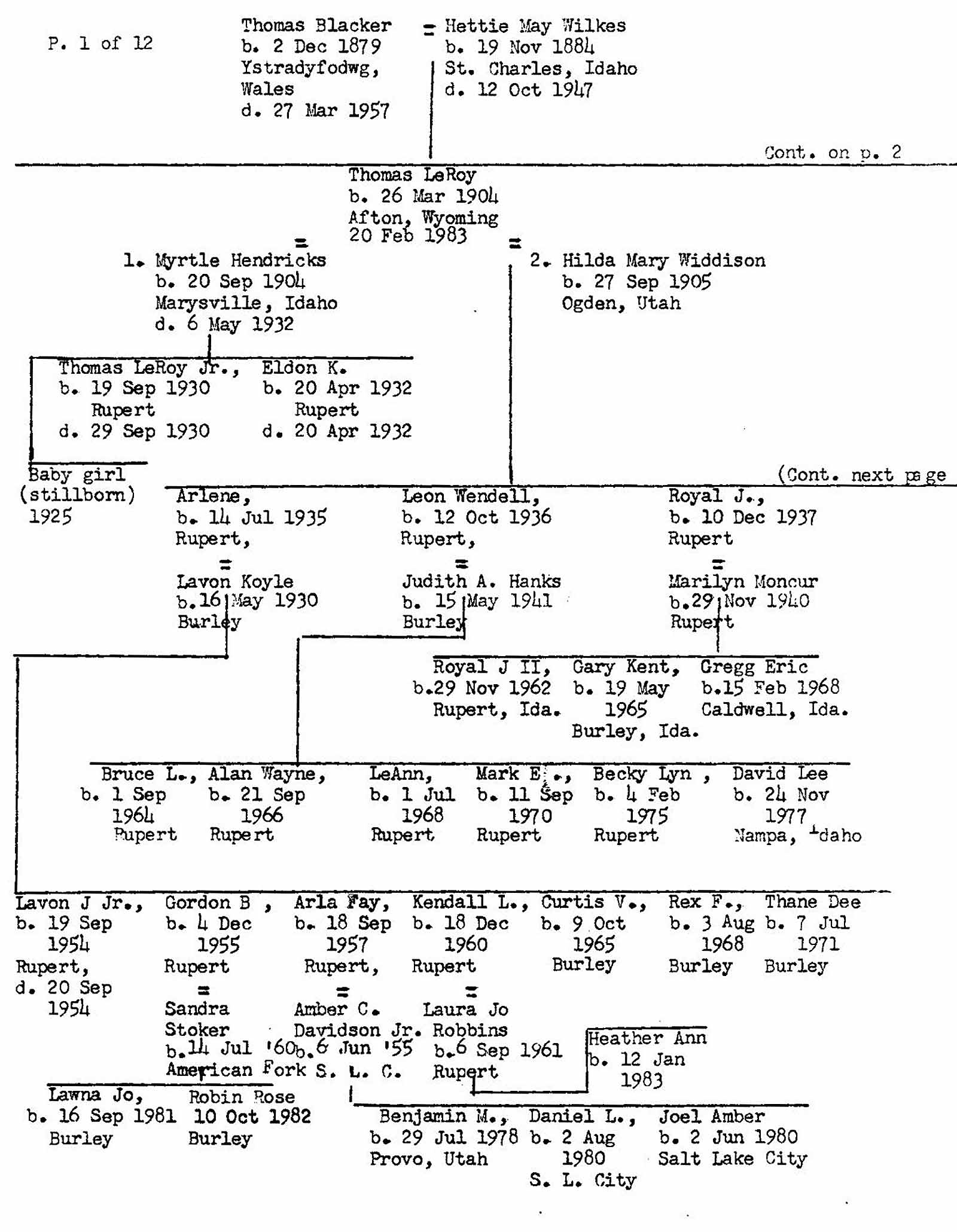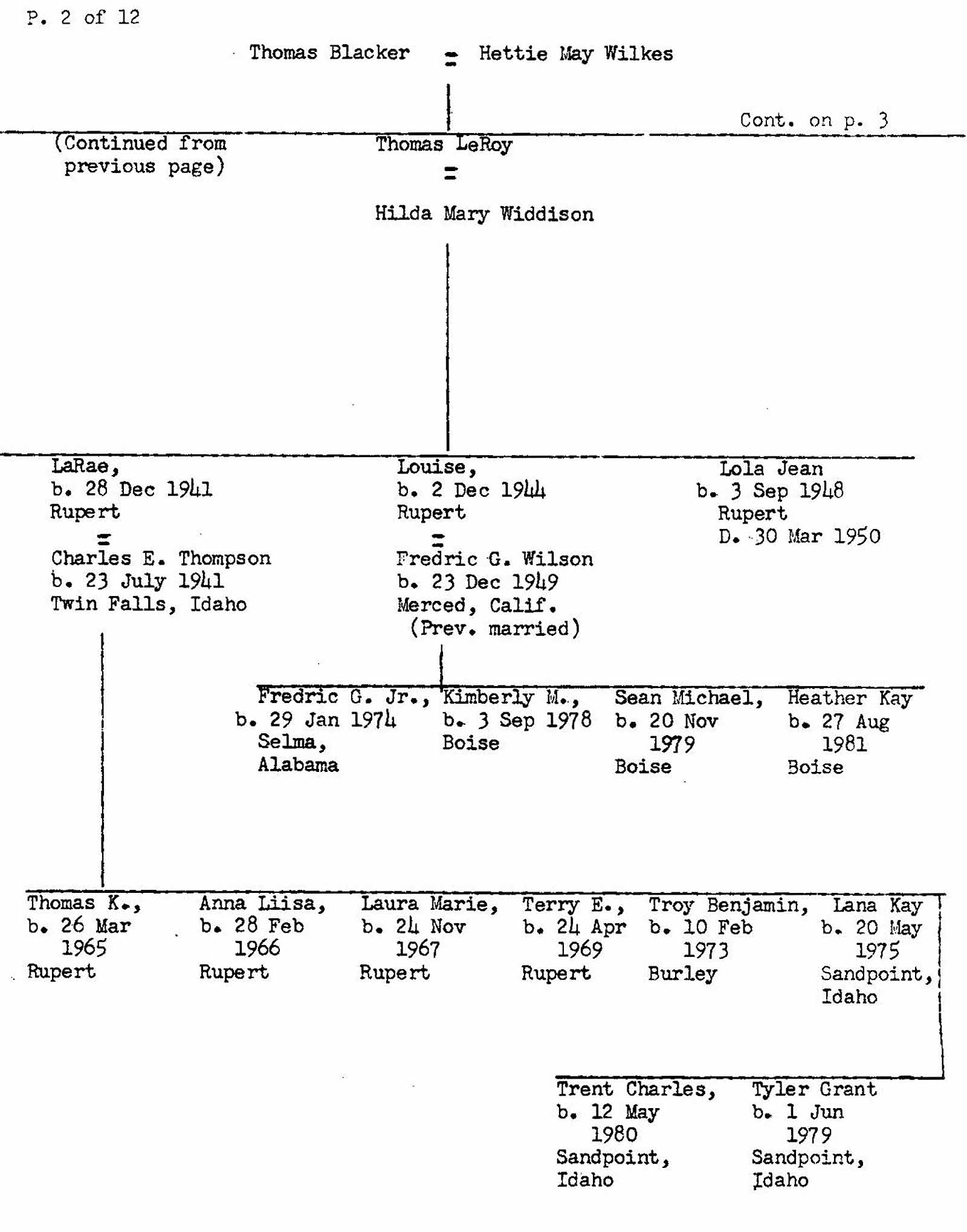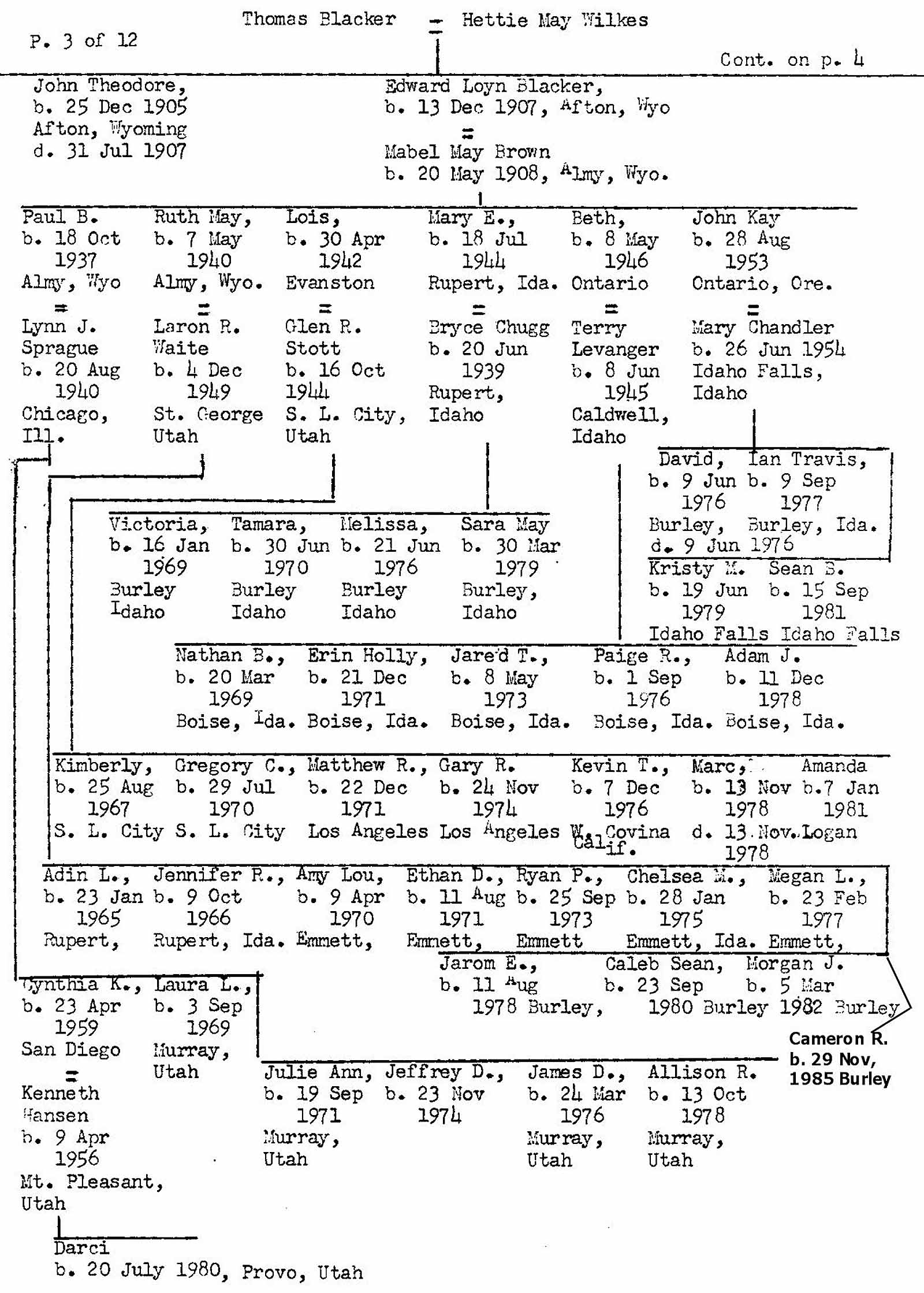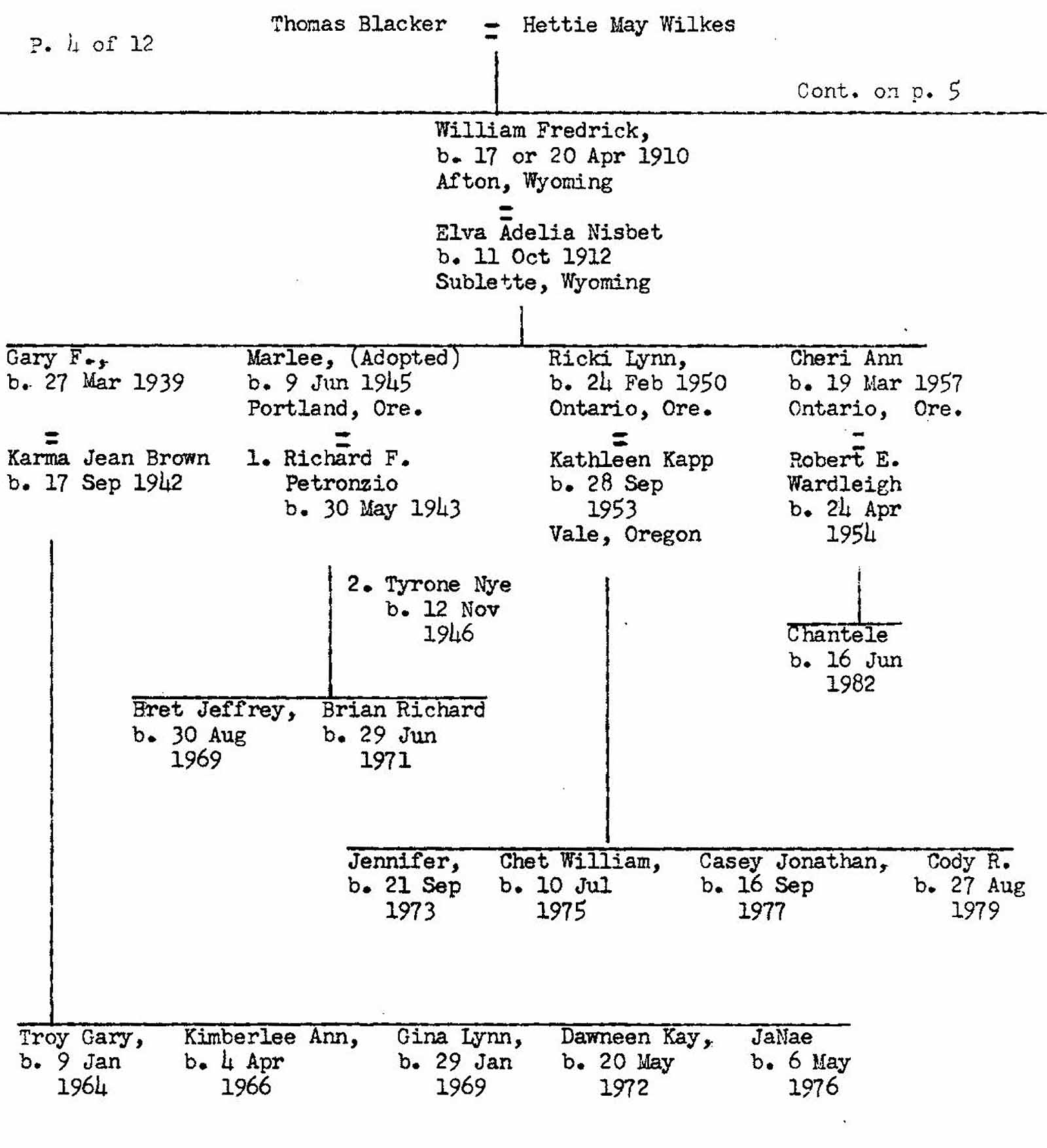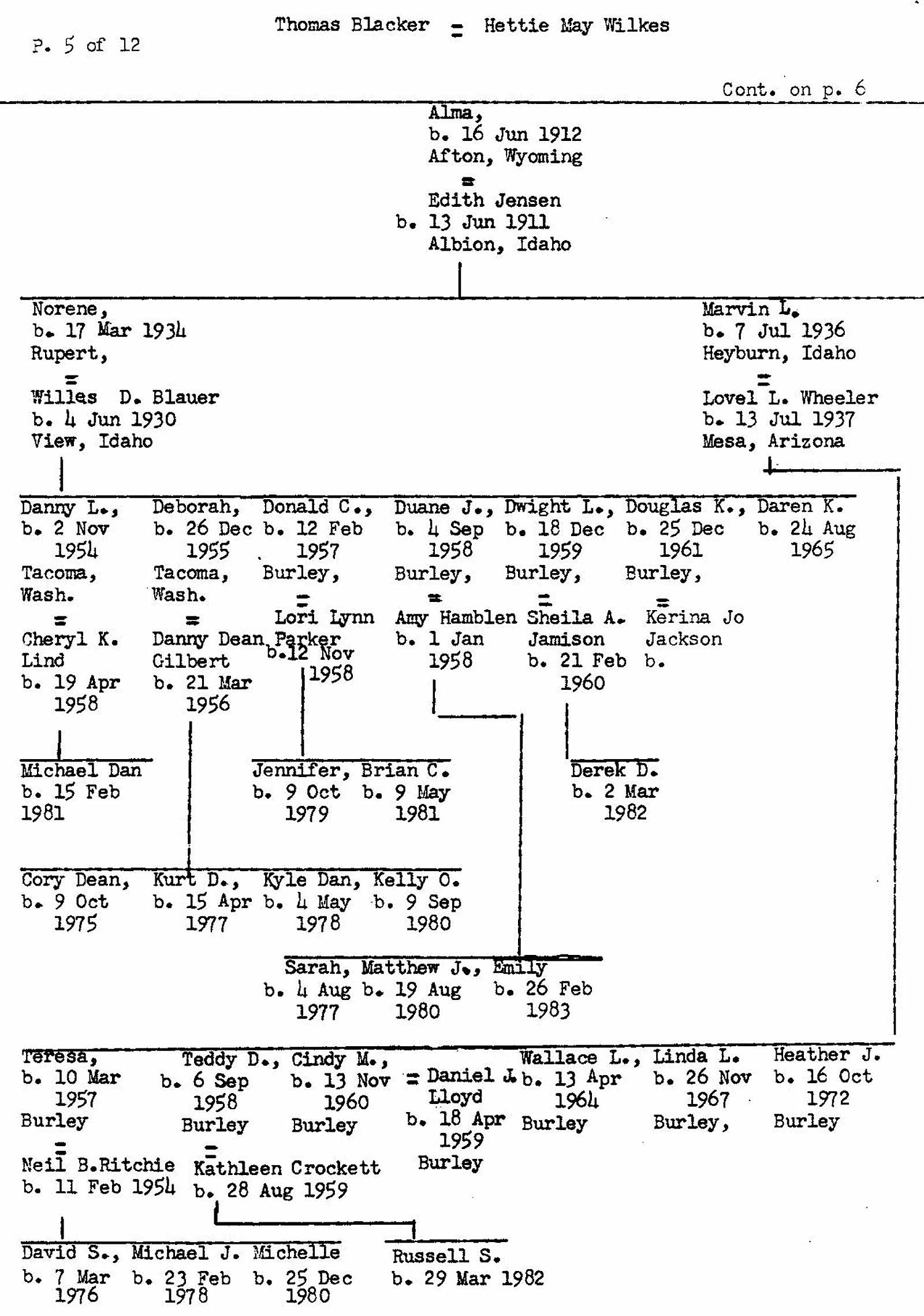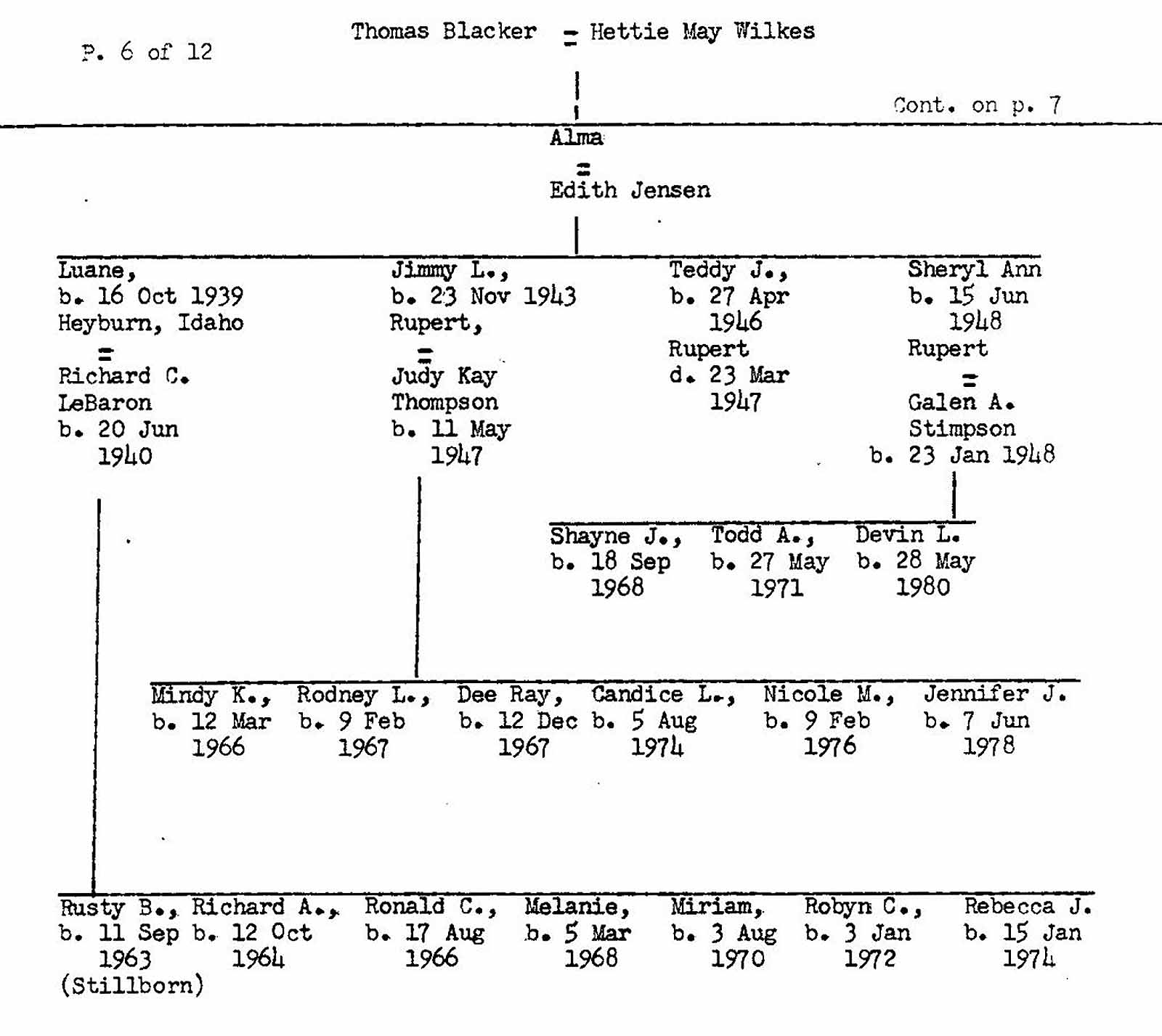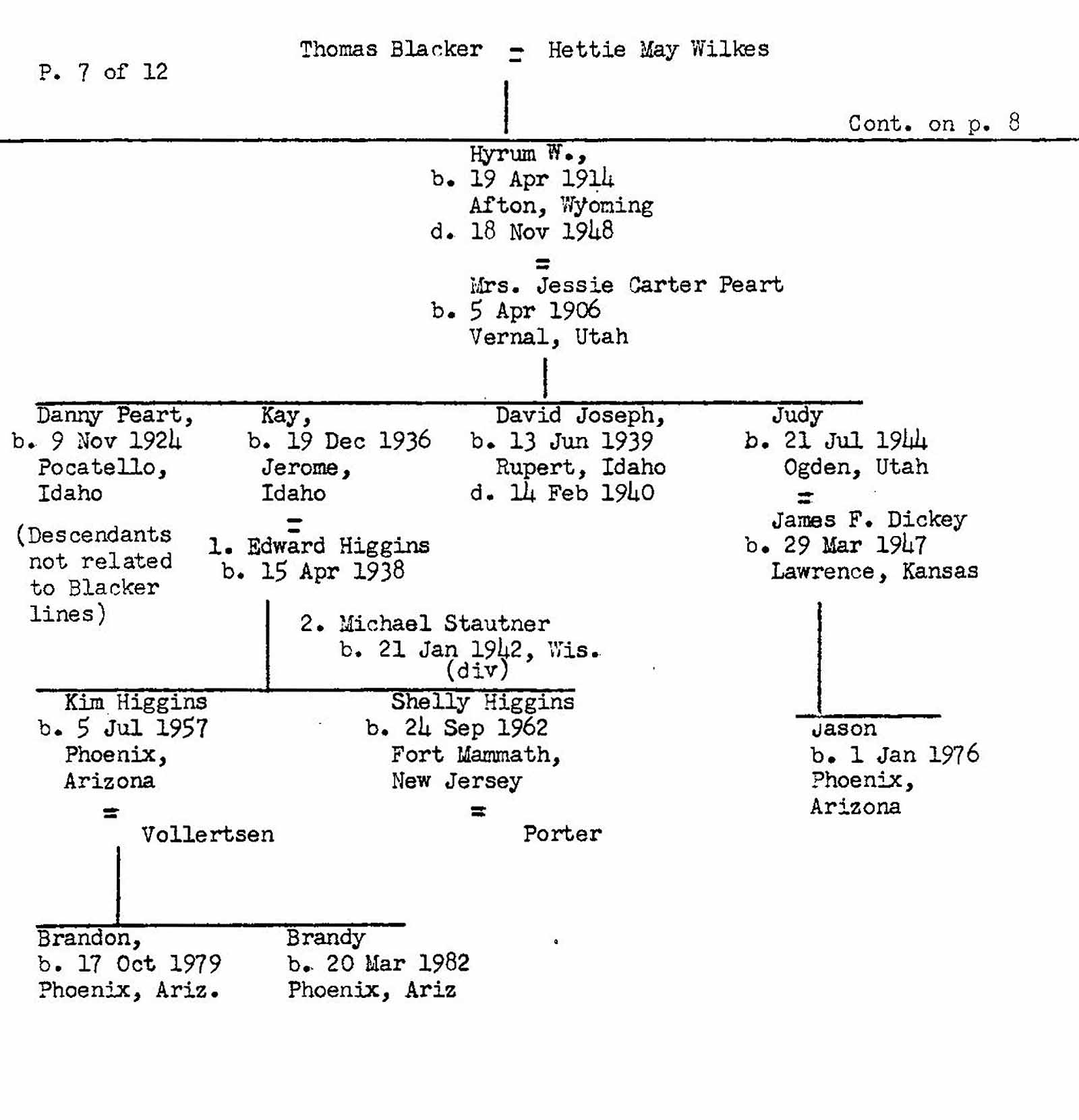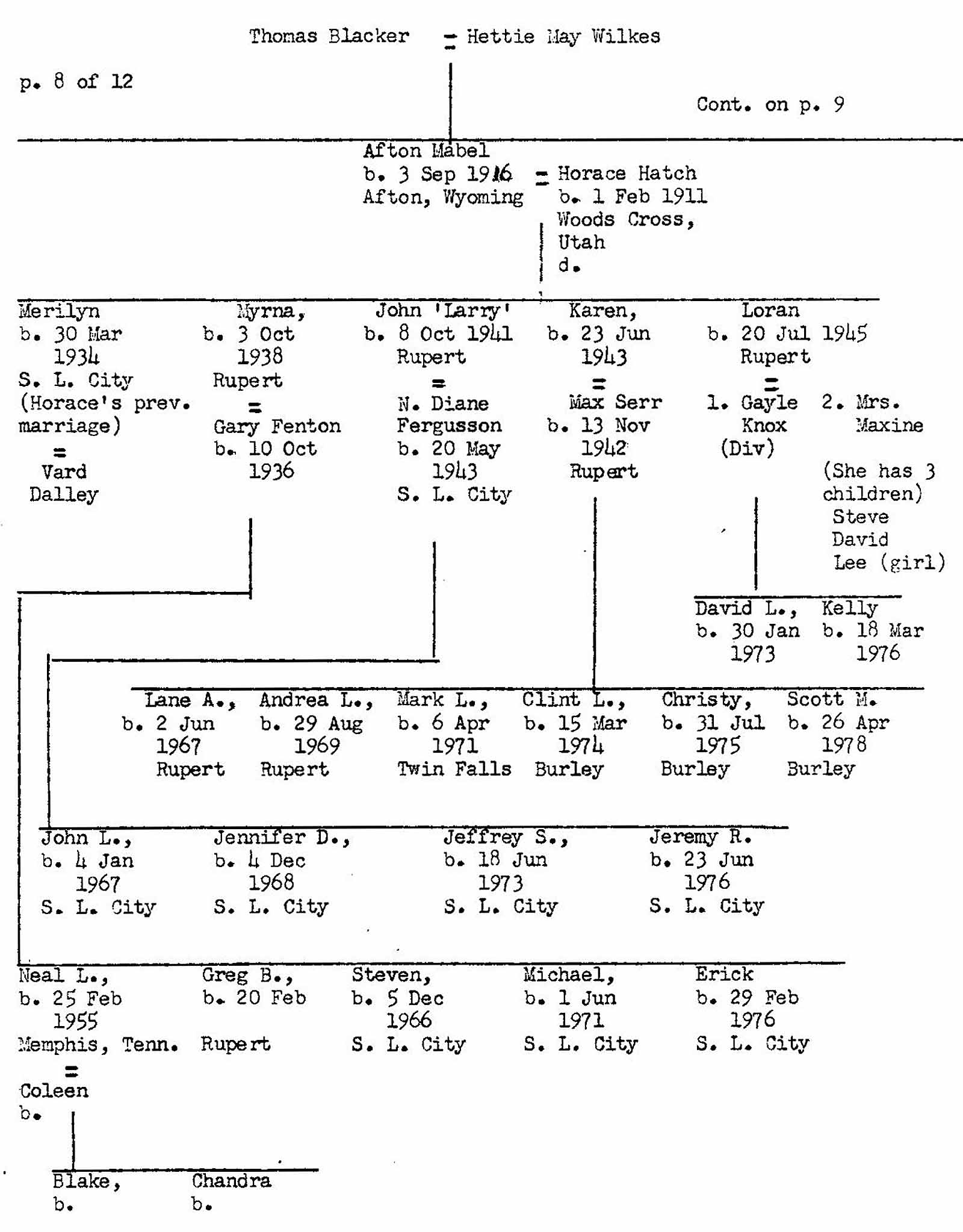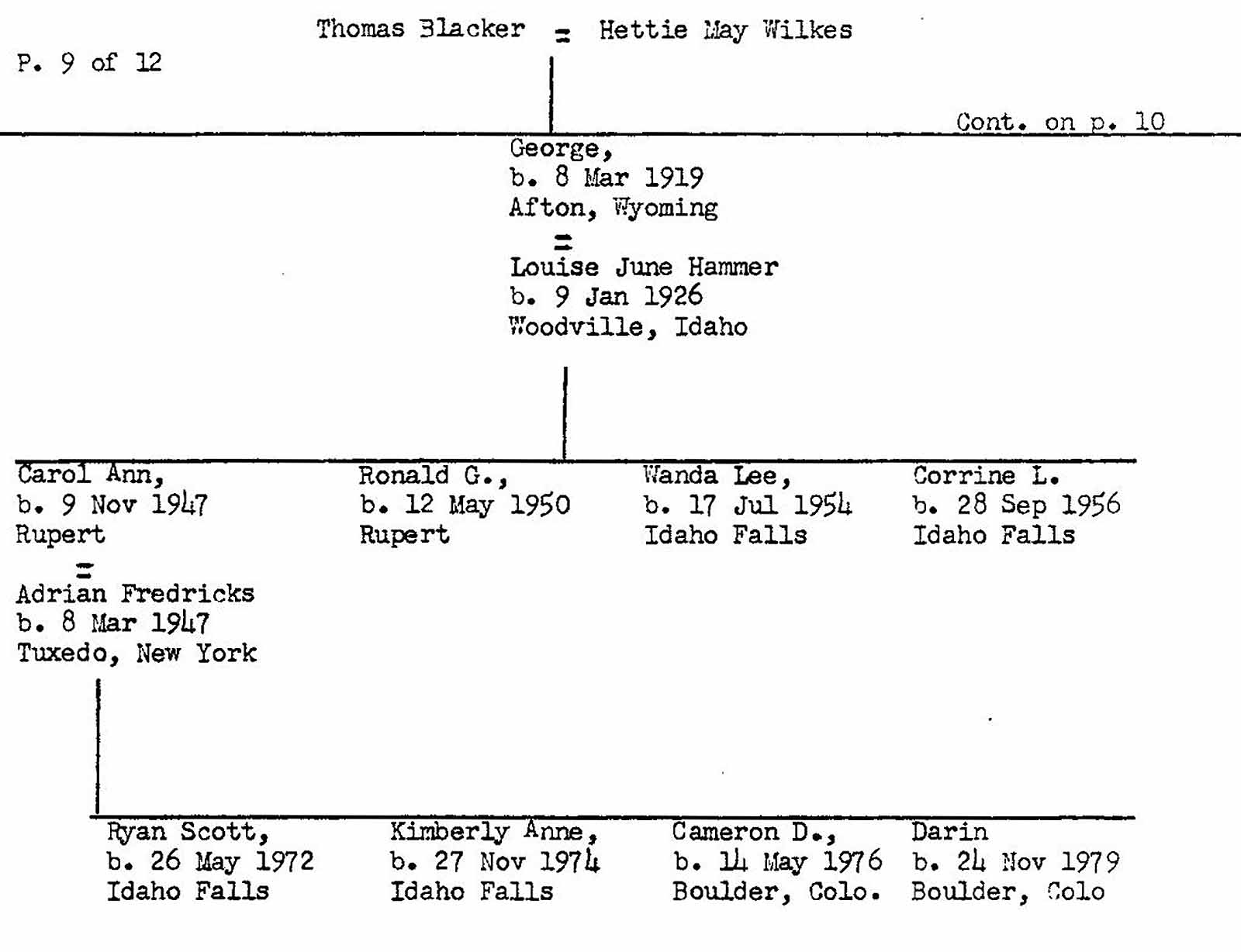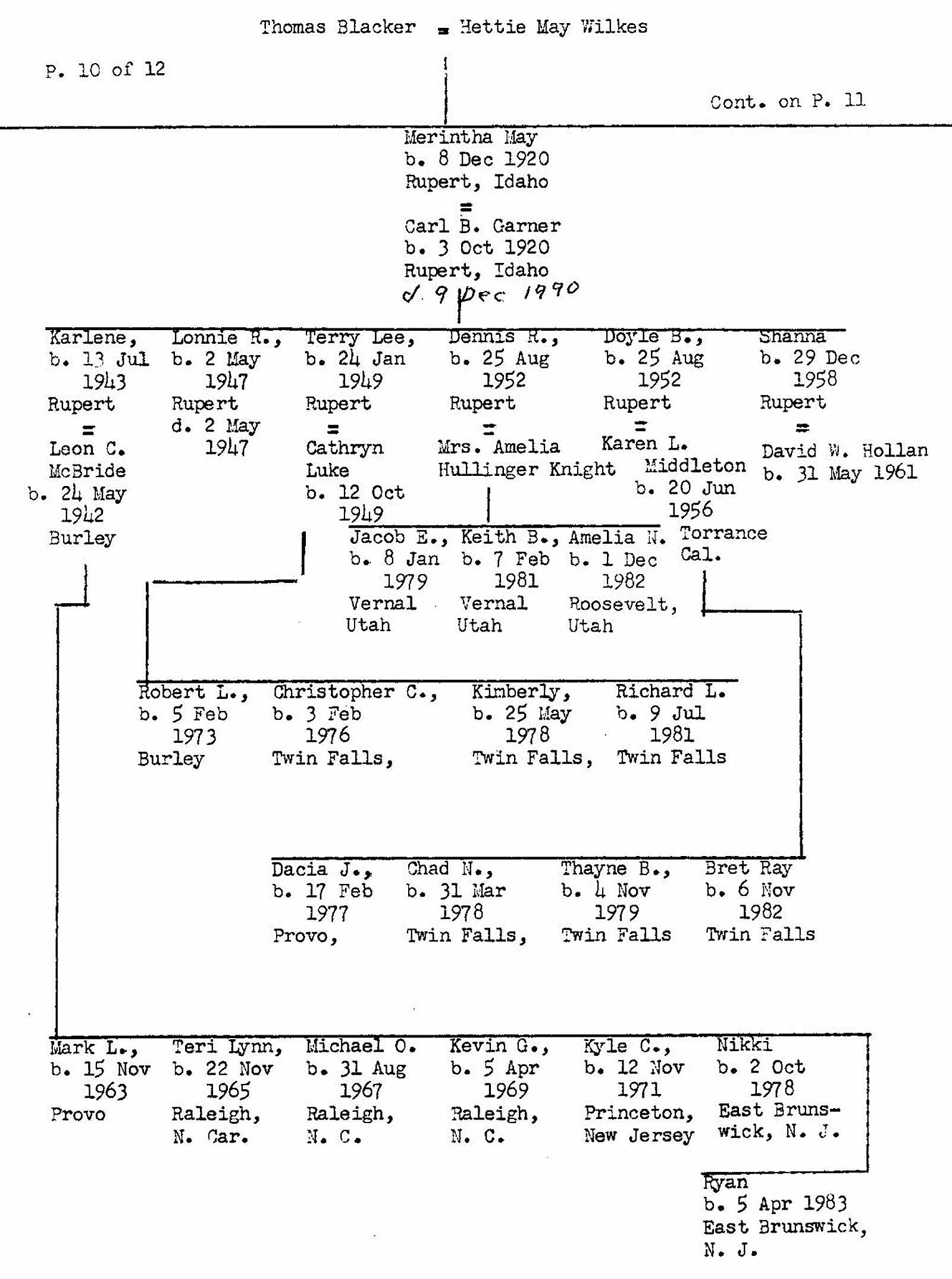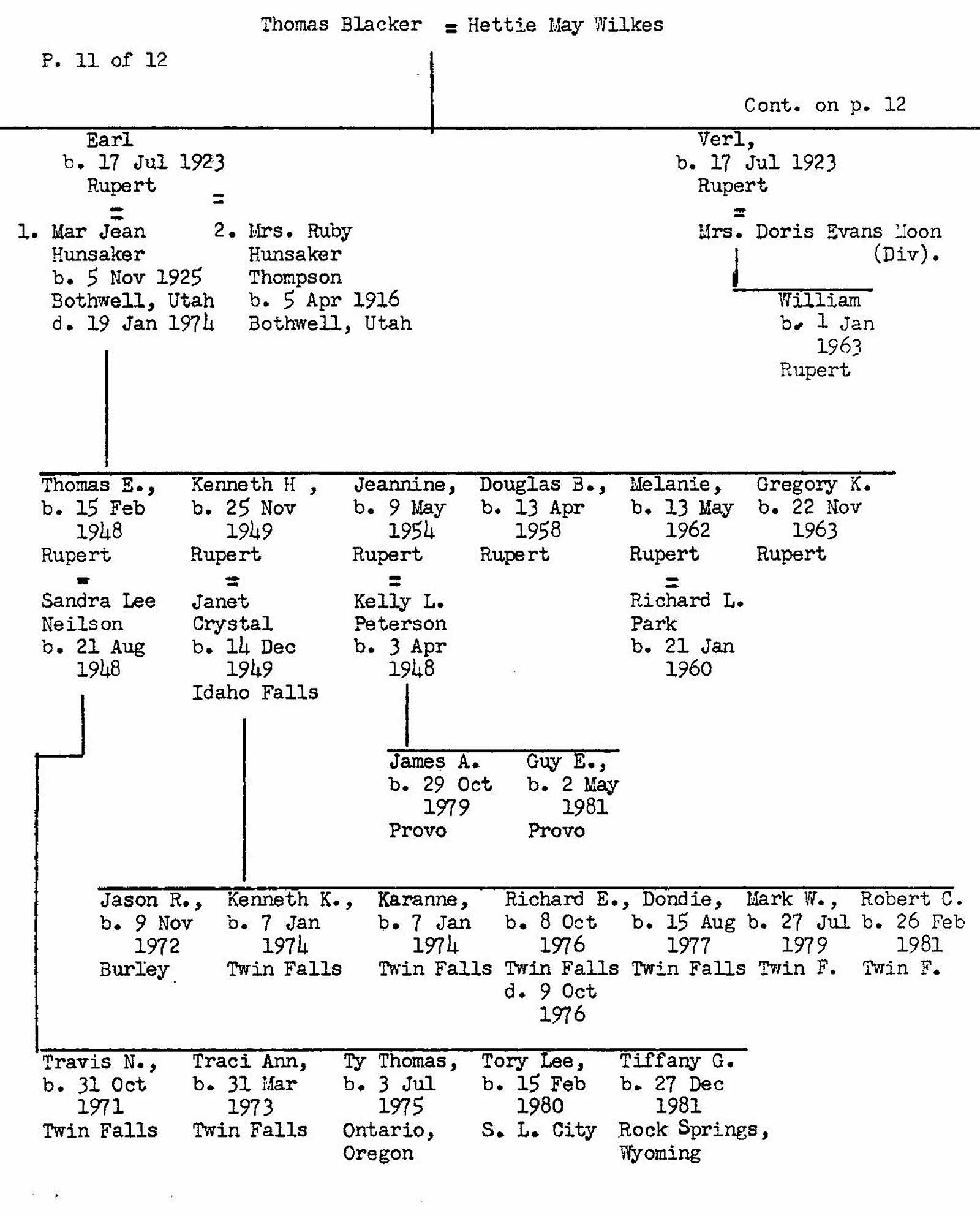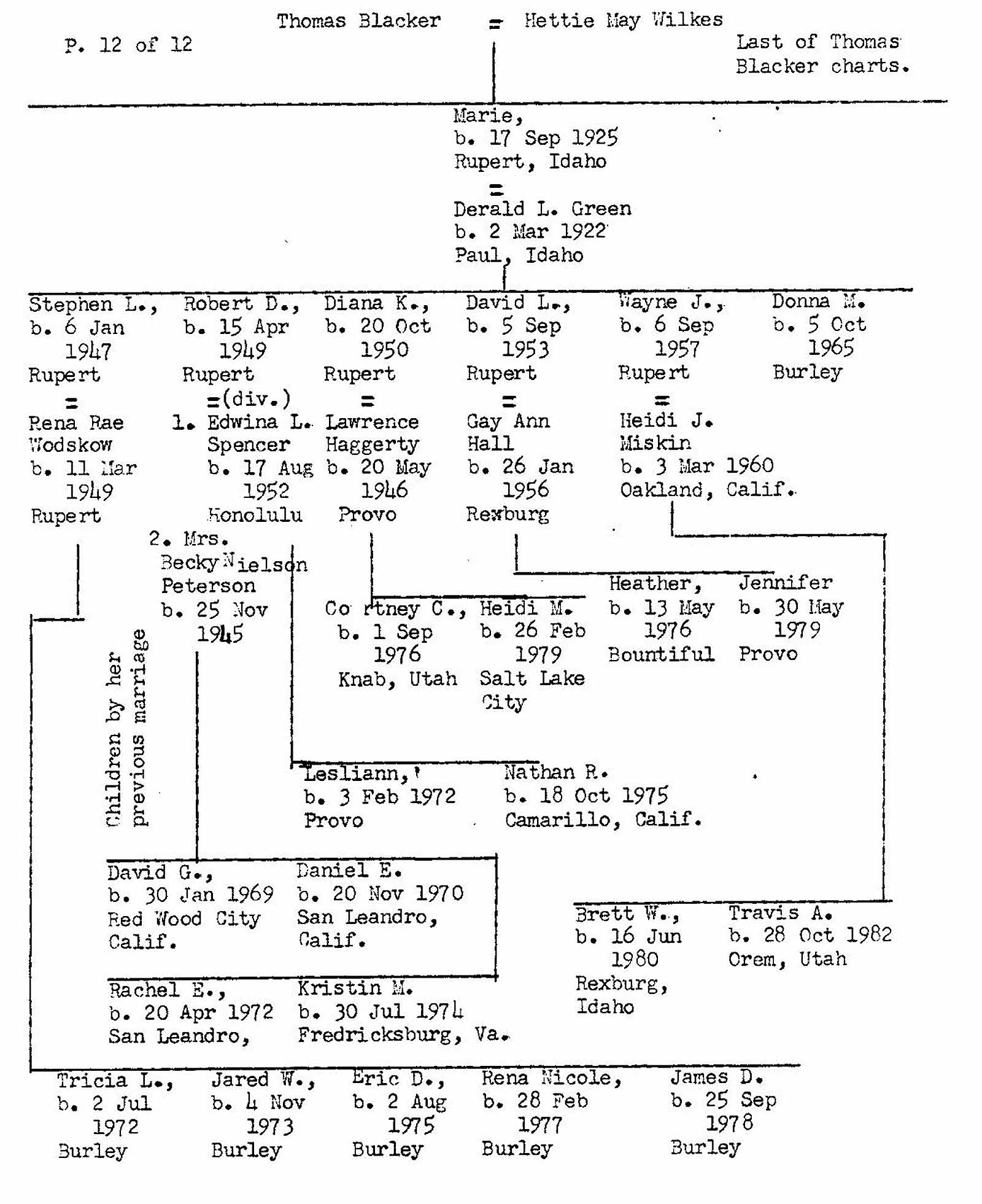The Hettie Wilkes And Thomas Blacker Family
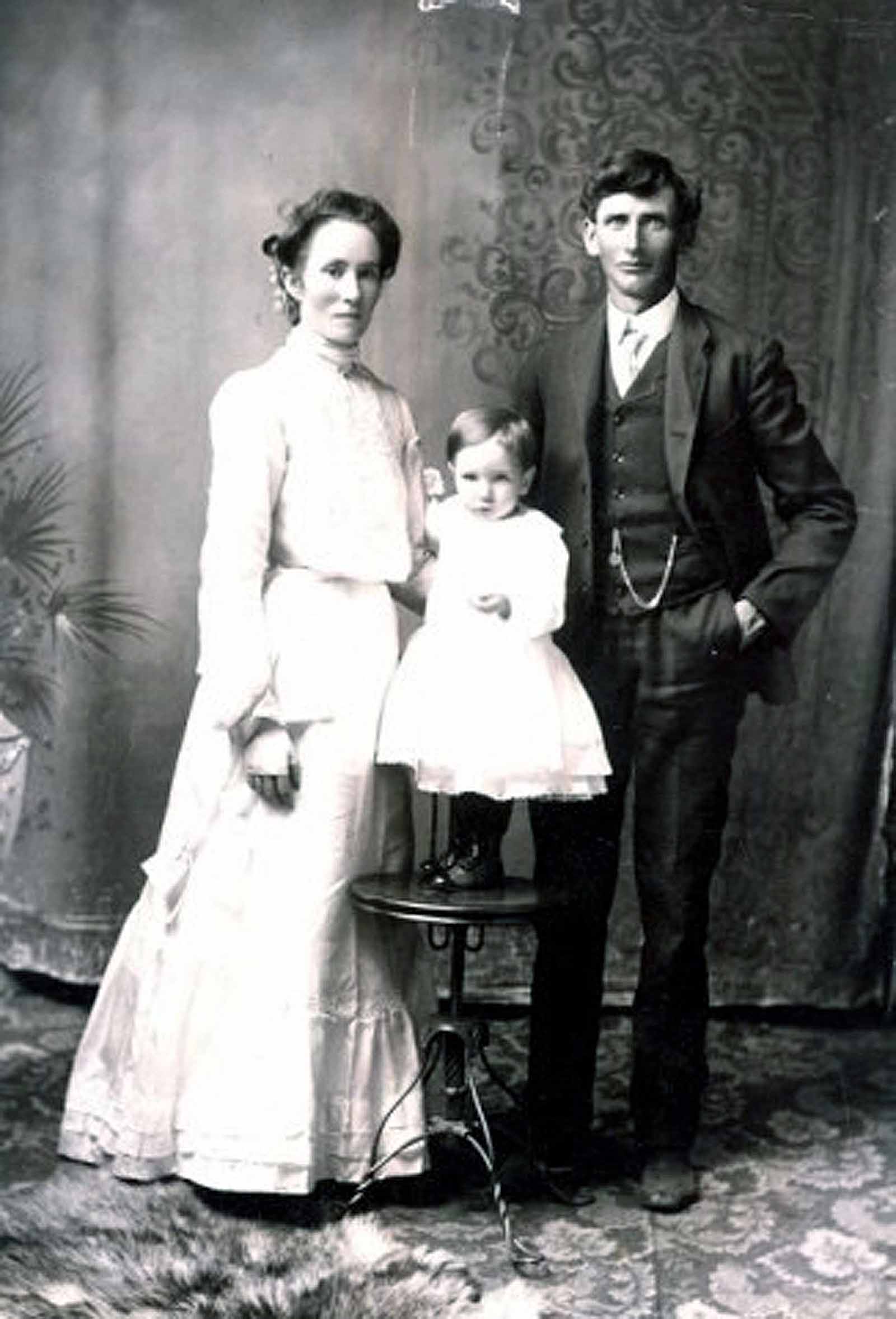 Hettie Wikes, LeRoy, Thomas Blacker. Spring of 1905, Afton
Hettie Wikes, LeRoy, Thomas Blacker. Spring of 1905, Afton
Earlier in this history mention was made of the brother and sister of the Wilkes' family, Ed and Hettie marrying, respectively, Mary and Thomas Blacker, also of Star Valley on the 10th of June 1903. Tom and Hettie moved into a little log house near the Blacker farm two miles north and one mile west of Afton.
He has assisted on his parent's farm and, if he was not already employed, he was soon to become employed by the Burton brothers on their meadow ranch across Salt River from the Blacker home. We are not positive that Tom and Hattie's first son, Leroy, was born in the little log cabin near the Blacker home on the east side of Salt River, or whether they had moved to the little log cabin on the Burton ranch. Nevertheless, they were yet working for Burton's when he was born on the 26th of March 1904. Actually, the baby was born at the home of Grandma Wilkes in Afton and after a few days, the new mother and baby returned to their own home.
Their stay with the Burtons was but for two or three years, when the Thomas Backers purchased a forty acre farm back on the Afton-Grover road just two miles north of Afton on the west side of the road. Within an additional year or two they purchased the neighboring 40 acres joining to the north of their first forty acres.
On the 25th of December of 1905 another baby boy, Theodore, arrived, but when approximately 18 months old he succumbed to the then dreaded whooping cough - this on the 31st of July 1907 and he was buried in the Afton cemetery. By the 13th of December of the same year, their third boy, Loan, came to fill the vacancy left by Theodore. While still in their two-room log house on the Afton-Grover road, boy number 4, Fred, was born on 17th of April 1910.
It was just six months prior to this event that Aunt Mary, the wife of Uncle Ed Wilkes, passed away leaving a mourning husband and their two children, Arvilla and Howard.
On a Saturday afternoon of late August of 1910, two little boys, Leroy, six and Loyn, not yet three, were strolling back toward the house with a small bucket of eggs gathered from the barns and the haystacks with their pet dog, Rover, walking between them. While yet eight or ten yards from the door to the house, a bolt of lightening struck and killed the dog instantly and hit the gable end of the house which quickly became a blazing inferno.
As the boys were approaching the house, their mother, Hettie, was kneeling in the doorway with her soap, bucket of water, and scrubbing brush, just finishing her Saturday's scrubbing in preparation for Sunday. The lightning bolt momentarily stunned her, but as she sensed what was happening, she waved for her boys to stay back and rushed to the bed on which was sleeping her four-month old baby.
Father, Thomas, was binding grain, seemingly on Grandpa Wilkes' farm just north of Swift Creek over a mile and a half away. How he got the message that his home was afire and his family had been endangered, we don't know. After seeing the lightning flash and the accompanying thunder, undoubtedly he could see for himself that the rising smoke and then the flames were coming from his own home.
To unhitch a three-horse team from a grain binder, pull the harness from Prince, the faster of the horses, and ride nearly two miles away - not knowing of the welfare of his family - had to be traumatic to him. What a relief it must have been when he had assured himself that all human life had been spared. His faithful dog was still lying on the spot where one or two of his little boys could have been stricken, in fact, his entire family.
While Thomas and Hettie remained in Star Valley operating their 80 acre farm and good-size herd of Holstein cows, their family continued to grow. Alma, the 5th son was born in 1912. Hyrum, number six came in 1914 when, following him in 1916 came a little girl, Afton, and then in 1919 - March - another boy, George.
The short summer season and the cold of the long winters, to a man who was particularly interested in crops from the soil, needled Dad to become attentive to the farming stories of the Minidoka Irrigation Project of south-central Idaho. After investigating, a move was made during the last two or three days of 1919. The family preceded him and son Roy, by two or three days, but on New Year's Day of 1920 a railway car arrived in Rupert with all the family's belongings including three horses and two Jersey cows, Dad and Roy aboard.
The inflationary prices of World War I's economy as mentioned in Aunt Luella's experience as, also, the Walker family experience as related earlier, came to a close by the severe depression of the early 1920's. particularly the recent investors in the high priced land of 1919 and 1920 were drastically affected by the economic reversal. The Thomas Blacker family was not alone in the painful experience of losing everything they owned. There was nothing by way of an alternate choice, but to throw their shoulders back and attempt a new start.
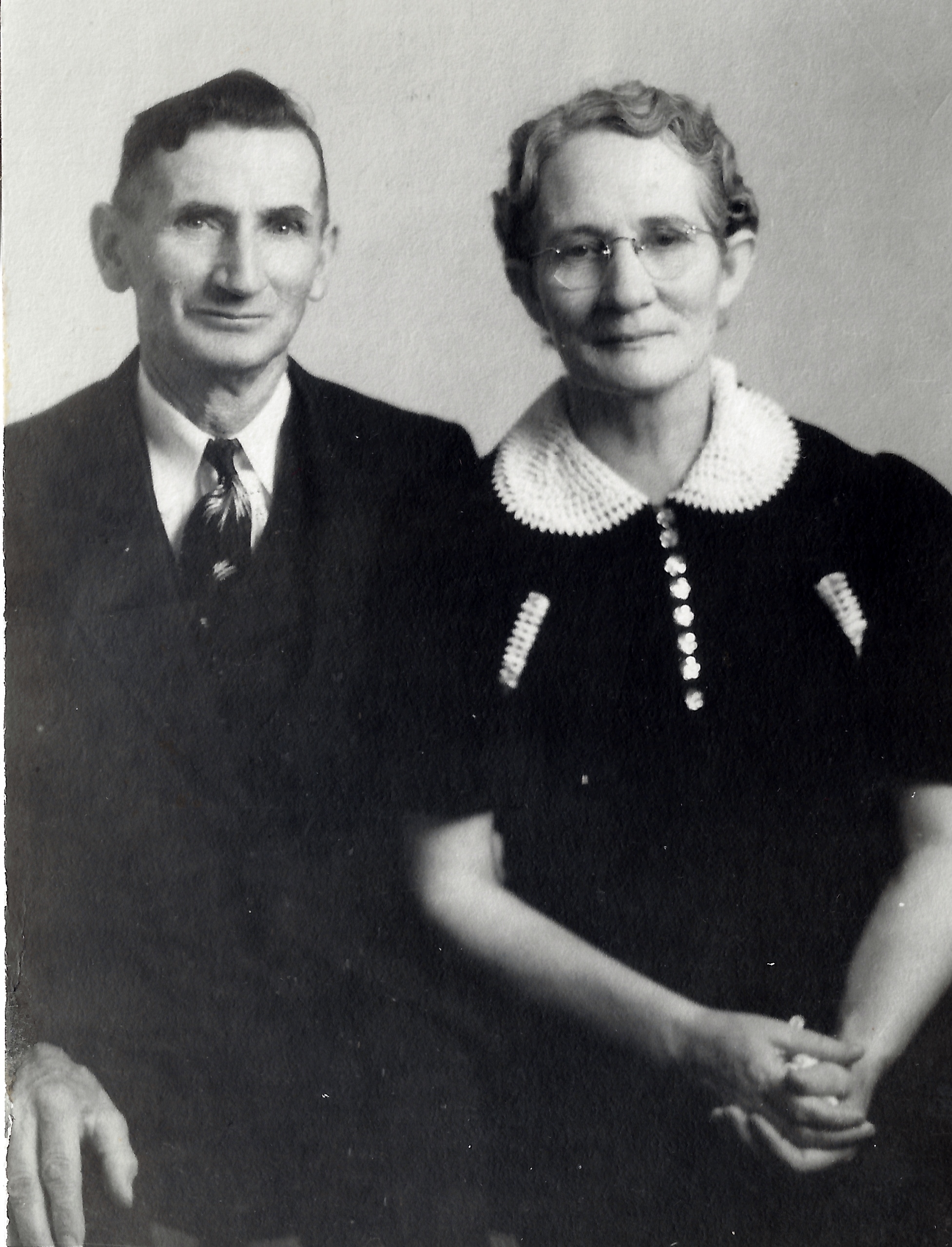 Thomas and Hettie Wilkes Blacker, 1937, Rupert
Thomas and Hettie Wilkes Blacker, 1937, Rupert
For two generations the Wilkes' families had confronted the same situation. When the William Wilkes' left England and crossed the plains in the late 1850's and when the John Wilkes' moved from Bear Lake on two occasions during the 1880's they learned the real meaning of poverty. At least the three families - children of John and Martha Wilkes - who hope to better their condition just before the 1920's and who moved to new homes from Star Valley, experienced very difficult years. This is not to imply these three families were the only ones who experienced hardships, for in the next decade the great depression of 1930's humbled us all.
As with other families, the Thomas and Hettie Wilkes Blacker story is far too long to be fully reviewed in this account. Seven of us living children made the move with our parents to Idaho, and four additional ones, Merintha, on the 8th of December 1920, twin boys, Earl and Verl, arrived on the 17th of July 1923, and lastly, baby Marie on the 17th of September 1925.
After leasing the farm which had to be turned back to the former owner, another opportunity opened up in early 1924 wherein the Amalgamated Sugar Company offered to lease an 80 acre farm three miles west of Rupert. By 1928 this farm became available to purchase on a several-year contract. This became the permanent home and was where all the children grew to maturity. In fact, 60 years later it is still owned by one of the sons, Earl, and where all of his six children were born and raised.
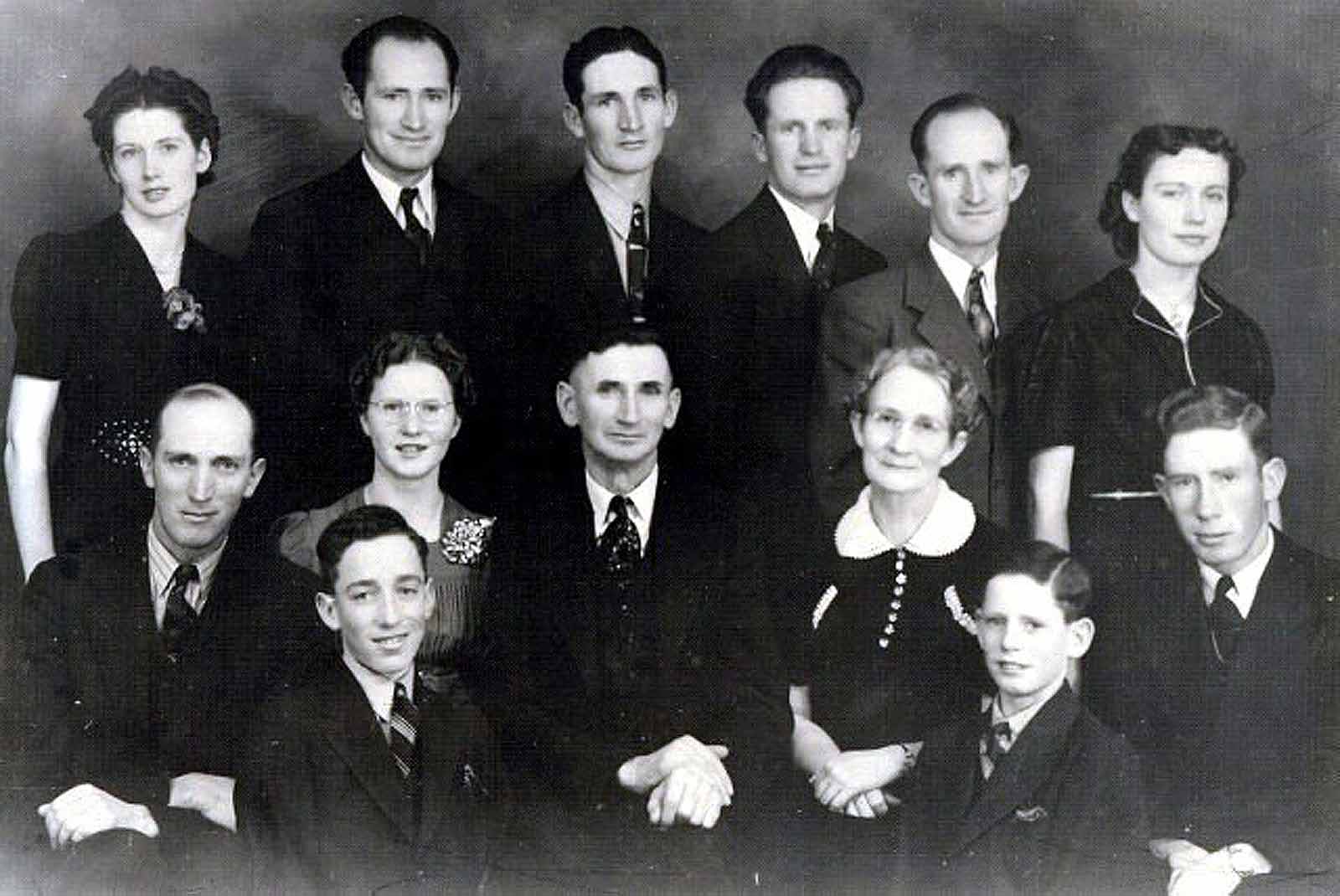 The Thomas and Hettie Wilkes Blacker family of 1937: Back row left to right:
Afton, Fred, Hyrum, Alma, Loyn Merintha. Middle row: LeRoy, Marie, Thomas, Hettie,
George. Front row and kneeling: Earl and Verl.
The Thomas and Hettie Wilkes Blacker family of 1937: Back row left to right:
Afton, Fred, Hyrum, Alma, Loyn Merintha. Middle row: LeRoy, Marie, Thomas, Hettie,
George. Front row and kneeling: Earl and Verl.
In 1942 Dad and Mother (Thomas and Hettie) retired from farming, leased the farm to various of his children and eventually sold it, and moved to a home in Rupert. Mother passed away on the 12th of October 1947. Dad later married his sister-in-law, Luella Wilkes, who retired from her grocery business in Pocatello and moved to Rupert. They spent several of the following winters in and around Mesa, Arizona, where Dad passed away on the 27th of March 1957. Aunt Luella remained in the home in Rupert until a few months prior to her passing away when she was moved to her daughter-in-law's (Edgar's long time widow who had remarried) home in Pocatello. Aunt Luella passed away on the 8th of July 1963.
As the readers are aware, one of the objectives of this history is to present a thumb-nail sketch or review of each of the grandchildren of Grandpa and Grandma Wilkes by way of an introduction to the younger generations - and to each other - in order for us to become a little better acquainted with our kin and to, more or less, enlighten each other of the direction we each went in life and the occupation followed. Now to Hettie's children in their order by age.
Leroy Blacker: He graduated from the Rupert high school in 1923 and found local employment in the local creamery, the sugar factory and eventually the Minidoka Irrigation District for a number of years. On the 28th of October 1924 he married Myrtle Hendricks. During their first few years they had the misfortune of losing a stillborn little girl in 1925, a little boy at birth in 1930 and a second boy at birth in 1932. Myrtle passed away of childbirth of their last baby on the 6th of May 1932. Broken hearted, Roy returned to the family home where he lived for the next couple of years and continued his employment with the irrigation District, helping to maintain the canal and lateral system.
On the 27th of September 1934 Roy Married Hilda Widdison of Paul, Idaho, a returned lady missionary and school teacher. To them, thru the years, were born six children, four girls and two boys. Nola Jean, their last, passed away when but 2 years of age in 1950. Note the family charts following each of these reviews in all families to become acquainted with the children and grandchildren. Son, Leon served a mission and boy boys have had the distinction of having been and/or still are serving as bishops in their respective wards.
Roy, during the last of the 1930's returned to farming where he continued until retiring and then spent several years as Minidoka County probate judge. (I failed to mention in our father's history, that he was appointed by the county commissioners to complete three years of an unfinished term of a former probate judge. He was encouraged by his peers to put his name on the ballot for an almost sure re-election for another four year term, but he declined for such would have defeated the very purpose of his retiring.)
Years later, Roy was encouraged by the local leaders of the Republican party to run for that same office and was successful into his second term. Before the end of his second term, the State legislature had reorganized the Idaho court system, and replaced the probate court by what they now term the Magistrate Court over which only lawyers and attorneys are eligible to serve. From that time, Roy was not eligible for he was without a law degree.
Churchwise, over the years, Roy has been active in many assignments such as Elder's quorum president, a member of the Seventies presidency and a long term bishop of the Rupert 2nd ward. He then served in the stake high council and in 1966 was called as a stake patriarch. In the latter part of May of 1975 he and wife, Hilda, were called to serve an eighteen month mission to the Canada Toronto Mission. The fact that he was a patriarch and that they had no patriarch in that are of the mission, their mission president, Russell M. Ballard, obtained permission from the General Authorities to use him in that capacity while in the mission field. They completed their mission in November of 1976 and returned home.
Leroy passed away in a Boise hospital on the 20th of February 1983 and had the distinction of having their mission president, but by that time a General Authority, Elder Russell M. Ballard, as a speaker at his funeral service. Roy was survived by his wife, Hilda, daughters, Arlene, LaRae and Louise and sons, Leon and Royal, all with families as shown on their family chart.
COOL HEAD AND SKILL BRINGS NATIONAL RECOGNITION
Fred Wilson, husband of Louise Blacker Wilson, daughter of Leroy and Hilda Blacker became a subject of acclaim thru the news media - national T.V., radio and newspaper - on 8 April 1982. One year later, less one day, a similar but not so dramatic experience happened. See below for Church News report as of 5 June 1983.
Fred, with Louise, was invited to Washington D.C. on 13 September of that year for a special national presentation. That we might be accurate in our reporting we invited Fred and Louise to briefly present further details which was done thru his personal secretary, Louise. She wrote:
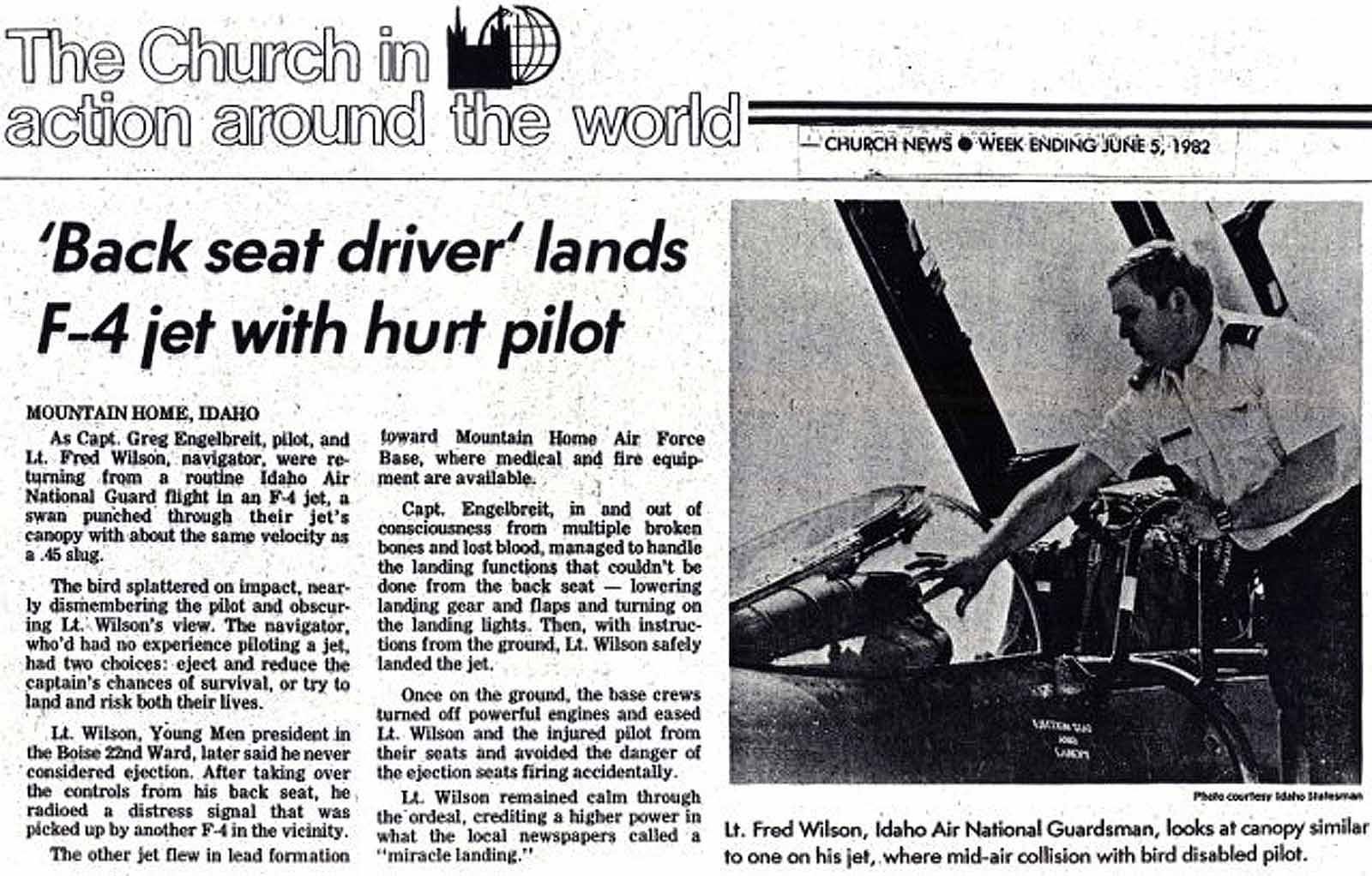
"On September 13, 1982, Fred received the Earl T. Ricks Award 'for superior airmanship and demonstration of the highest standards of crew co-ordination while flying an RF-4C, in successfully recovering from a night in-flight emergency that included aircraft damage and bodily injury'.
Louise continues, "This award was given by the Air Force Association at its annual convention at the Washington D.C. Sheraton Hotel. We were guests of the association for six days.
"On April 10th, 1983, Fred was awarded 'The Distinguished Flying Cross' for 'heroism while participating in aerial flight' as a Weapon Systems Officer near Mountain Home Air Force Base on 8 April 1982. He received this medal at ceremonies held at Gowen Field, Boise, on Sunday of the above date.
"Fred was also involved in a second bird strike on 7 April 1983 one day short of a full year following his first encounter with a bird, the second time with a duck rather than a swan, near the City of Rocks some thirty miles south of Rupert. This time a duck came through the right front quarter panel of the canopy striking the pilot in the right shoulder. He was bruised badly, with lacerations, but no broken bones. Fred flew the aircraft the 15 minutes from there to Mountain Home and then the pilot, Major Dave Hudlet, was able to land the plane in spite of his injuries.
"We are thankful that Fred, again, escaped injury. He's making a nervous wreck out of me, though" so Louise wrote. Thanks, Louise, and to you, Fred, be careful with your diving. Perhaps those air-lanes are for the birds. (Did we hear correctly, 25,000 feet?)
Fred and Louise live in Boise with their five children.
P.S. Following the above mentioned presentations - in Boise and Washington D.C. - nearly a year later, on the 29th of August 1983 Fred and Louise were again called to Washington D.C. to receive another award, this time the Cheney Award, a meritorious award which was presented by the Air Force General.
Loyn Blacker: I graduated from the Rupert high school in the spring of 1926 and served a mission in Ireland and England from January of 1928 returning in April of 1930. After farming for two years I attended Ricks College and Idaho State Normal, graduating from Albion in 1935. Taught school in the Hilliard, Almy and Evanston, Wyoming schools into my eighth year from which I resigned to return to Rupert after purchasing my parent's herd of 20 plus Jersey cows and their farm equipment and leased their farm from which they were retiring.
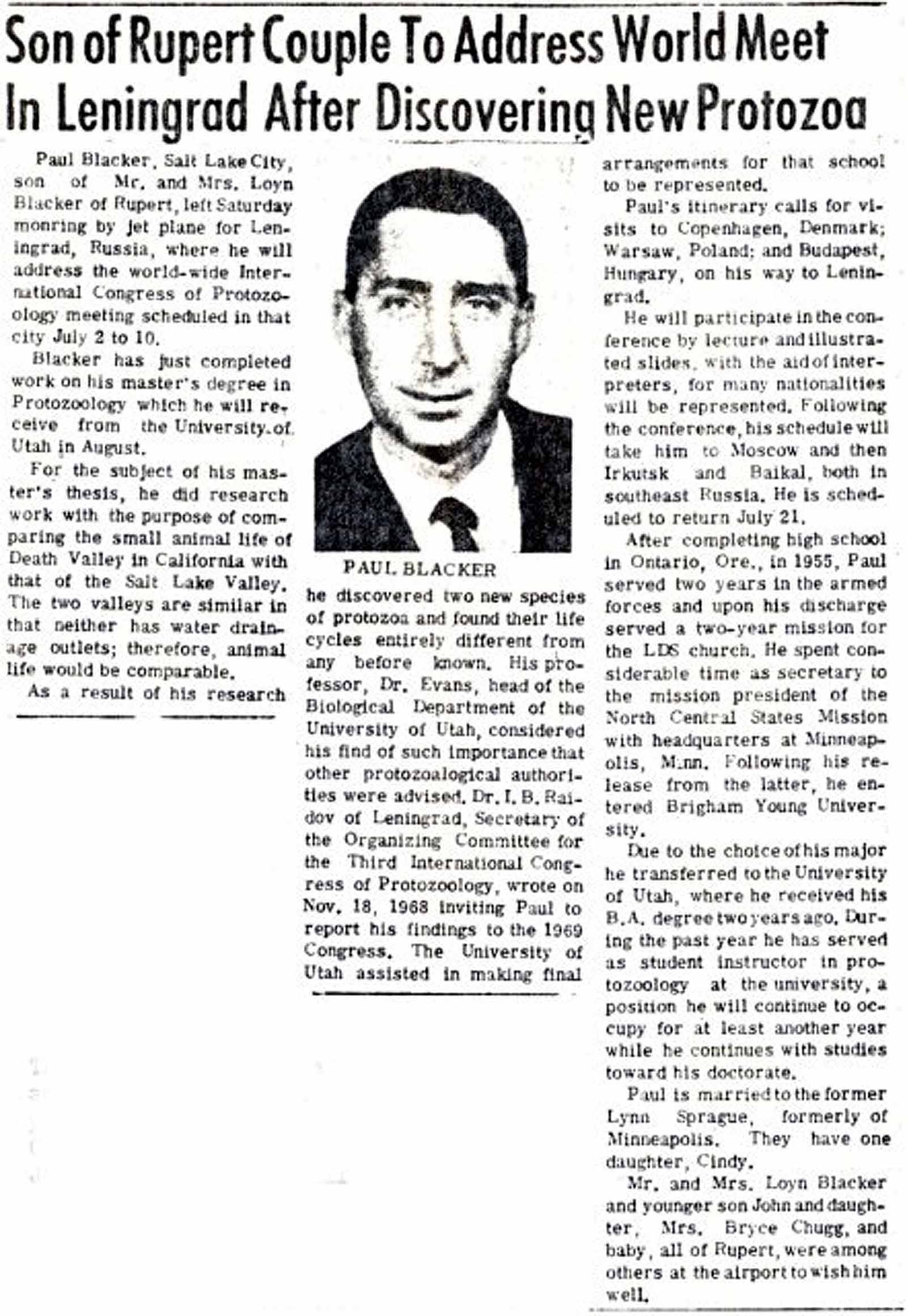
In the meantime, I met a returned lady missionary from Hilliard, Wyoming, Mabel Brown. We were married in the Salt Lake Temple on the 9th of October 1936. Subsequently six children, 2 boys and 4 girls, in their turn, came to live with us.
With my brother, Fred, we purchased a furniture business in Ontario, Oregon, and moved there on the 28th of December 1945. In August of 1956 we sold our home and business interests and returned to Rupert and purchased a furniture business, forming a corporation with my brothers - both farmers - Leroy and Alma as stockholders, both inactive so far as the business was concerned.
On May 10th 1975 my wife, Mabel, and I entered the Mission Home in Salt Lake City for an eighteen month mission to the England-Leeds Mission and were assigned to the Bolton, Lancashire branch where we served our entire mission, returning home in October of 1976.
Thru the years I have loved to 'think' thru my fingers on the keyboard of the typewriter, the results of which I have written two full evening pageants and a three-act drama, all of which, in separate years, were presented to large audiences on a stake-wide basis. At the morning session of stake conference, two days following the presentation of "The Day A Stake Was Born", in honor of the 50th anniversary of the organizing of the Minidoka Stake, the stake president, conducting the session, made comment on the pageant and stated the production to be worthy of a Hollywood "Emmy Award". The 2nd pageant was titled "Birthright Blessings" and presented in the Minidoka and Nyssa stakes. The drama was titled, "Be Ye Not Unequally Yoked" and was presented in the Minidoka stake.
Among my writings is a 150 page treatise entitled "To Heaven the Scripture Way" which is a defense against the "saved by grace" doctrine espoused by, especially, TV evangelism and other ministers with whom I have, for many years, corresponded. My intent has been and will continue to be to present a copy as my testimony to my grandchildren as they reach graduation age from high school, some of whom already have. These loved ones already or will come to know my position.
Following the division of our old Minidoka Stake, the two presidents of the two offshoots, invited me to compile a history - 50 years - of the parent stake. In December of 1980 I presented these stake presidents with the manuscript for them to do with what they felt best. The result was a hardback 348 page printed volume which has been distributed throughout the two stakes.
Family-history-wise, as many of you are aware, I compiled a history of my parents in 1971 titled, "Born of Goodly Parents, the Story of Thomas and Hettie Wilkes Blacker", a 125 page history bound such as is this history.
In 1983 I compiled at 250 page ancestral history titled, "Our Kith & Kin, Then and Now, The Blacker Epic, 1650 - 1983, and ancestral history of the Edward Blacker and allied families very similar in nature to the volume you are now reading, excepting this is "The Wilkes Epic, 1596 - 1984".
Churchwise, our entire family has been active thru the years. Four of our children have served full-time missions. Including Mabel's and my stake missions, our immediate family has served a total of 24 years as missionaries. Due to our moving and thru division of stakes, I have served on seven separate high councils and with all but one stake, had the assignment of direct temple and genealogical work. Mabel has served as a ward and as a stake Relief Society president. We have the distinction of now having served for the past over twenty years in the Burley Regional (7 stake) Genealogical Library.
Fred Blacker: Fred graduated from the Rupert high school in 1928. Fred found employment in the Rupert store of the old O.P. Skaggs grocery chain. In 1934 de decided to attend the Idaho State Normal and with his attending summer school at the Lewiston Normal in northern Idaho, he was also graduated in 1935 from Albion. He was either fortunate or unfortunate in not obtaining a teaching position. This was during the mid 1930 Great Depression and there were far more applicants for jobs than job openings. School teaching jobs were going at an annual salary of $800, hardly enough to keep body and soul together.
On the 14th of November 1935 Fred and Elva Nisbet were married and Fred found employment at a service station and shortly after leased the business and operated it himself. He later obtained a railroad office clerk's job and by the early 1940's found himself assigned to the freight office in Ontario, Oregon.
He became acquainted with a man who wished to sell his Ontario furniture business. It was at this point he telephone me in Rupert advising of this potential. He asked if I (Loan) was interested in forming a partnership. Our check was in the mail the next morning. This was in May of 1945. In about 1958 - perhaps 1960, Fred likewise sold his interest in Ontario and he, with his sons, started the big furniture business in Willard, Utah, which has been enlarged to more than occupy the entire Fred Blacker family.
In the fall of 1930 Fred served a two year mission to the Western States Mission returning home in the fall of 1932 - this of course, prior to his attending his advanced schooling.
Fred and Elva are the parents of three children, adopting their second in order of age, totaling four.
Churchwise, while in Ontario, Fred was serving on the Weiser Stake high council from which position he was called to serve as second counselor in the newly organized stake presidency. Two or three years later the stake was divided forming the new Nyssa stake and he was called as first counselor in the stake presidency. Here he served for several years until his move to the Willard, Utah, area. In Willard he was called to serve as bishop of one of the wards which position he held for several years. Both their sons, Gary and Ricky served foreign missions.
Alma Blacker: after finishing his high school years Alma married Edith Jensen, also of Rupert, on the 5th of April 1933. Alma has always been a farmer at heart so he and Edith did not find it difficult to determine the direction of their life's work. A farm had already been rented south of
Rupert which they farmed for two or three years, but renting was not their goal. Their industry convinced an owner of a farm that it would be safe to sell to them which he did and they found themselves on an eighty acre farm in the Emerson district five miles west of Heyburn. The house was humble, but the soil was good and it was not many years until there was a good dwelling. It was not many years until another 80 acres joining them on the south was purchased and subsequently an eighty acres to the east which made a total of 240 acres of choice farm land.
During these years Alma started a small feed yard in which he winter-fed young beef animals preparing them for market. Alma did considerable buying and selling young beef animals thru the local sales yards wherein he was quite at home.
In the early 1950's when deep well pumping was starting on the desert areas, Alma became involved in a several hundred acre project south of Burley which he late sold to a son and son-in-law for their separate farms.
Of late years Alma sold off parcels of his 240 acre home place and they purchased a nice home in Burley where they have subsequently made their home. For several years Alma and Edith have spent three or four of the winter months each year in a trailer home in Yuma, Arizona.
Their six children range in birth years from 1934 to 1948. A little boy, Teddy, passed away when but a year of age on the 23 March 1947. Two, Luane, and Jimmy served missions.
Churchwise, their family has always been active in the Church. Alma served in the Emerson ward bishopric for several years. At this writing in 1984 his health is not good and required oxygen tanks close by so he can have ready access to them.
Hyrum Blacker: Hyrum, naturally spent his growing up years at home. Following high school years Hyrum found employment locally and on the 6th of Sep. 1934 married Jessie Carter Peart who had been married previously with a little son. To them were born a girl, a boy who passed away in what they call 'crib' death at the age of eight months on the 14th of February 1940. Another little girl arrived four years following this tragedy. Hyrum was employed in the grocery business in Ogden for a few years and they returned and ran the old family farm for a couple of years here in Rupert. In 1947 Hyrum, Jessie and their two little girls purchased a small grocery business in Vernal, Utah, which they were operating when Hyrum suddenly passed away on the 18th of November of 1948. Jessie continued with the store for a short while, but found it was too much for her to continue with it. She eventually moved into the Phoenix, Arizona, area where her girls grew up and married and where they are still residing. Jessie still (1984) lives alone in an apartment in one of the girl's home. Hyrum was buried in the Rupert cemetery.
Afton Blacker Hatch: after six boys in the family of Thomas and Hettie Wilkes Blacker a little girl was born on the 3rd of September 1916 while the family was still residing in Star Valley. After completing high school in 1934 Afton remained at home until her marriage to a local man, Horace Hatch on the 19th of November 1937.
He was already operating his parent's farm in the Pioneer district near Rupert which he ran for several years after which they purchased an eighty acre farm three miles east of Rupert. Horace was a young widower with a small girl 3 1/2 years of age. To the new marriage four children, 2 boys and 2 girls, in turn arrived - a boy and a girl, a boy and a girl. The children were gifted musically, especially the girls and both boys were athletically inclined, especially in baseball and basketball. Oldest son, Larry, served a mission in England. Youngest daughter, Karen, reigned as Minidoka county beauty queen for a year while a senior in high school.
After the children were all married, Horace, passed away suddenly with a heart attach while still in the hospital following an operation from which he was recuperating nicely. Afton has lived alone for the last 15 or more years and has been employed at the Simplot Potato Processing plant in Burley, having just this last spring, retired. Theirs had been a temple marriage.
George Blacker: George graduated from the Rupert high school in about 1937. He worked on the farm and at various jobs such as two or three years for the dry cleaning business. In July of 1945 he married Louise Hammer of Idaho Falls whose mother owned and operated the general store at Osgood, five miles out of Idaho Falls and who was ready to retire. George and Louise purchased the business and thru these many years have and are still operating the business. In the early 1970 they built a nice home within the city limits where they have since resided and commuted to their business. George accepted a position with the Idaho Falls hospital as a floor maintenance specialist. He retired from that position in 1932. Their son and all three daughters graduated from the Brigham Young University. A couple of their girls distinguished themselves on the B.Y.U. volley-ball team. George and Louise are still tending store at Osgood. Theirs had been a temple marriage.
Merintha Blacker: After graduating from high school in about 1939 Merintha didn't have to wait too long before her marriage to Carl Garner which event took place 4th of December 1940 in the Salt Lake Temple. They started out and still remain on their farm northwest of Rupert, however, most of the farm operations have been turned over to their sons.
Their twin boys served missions for the Church. Prior to their missions they both spent a couple of seasons with the B.Y.U. talent troupes touring the U.S. and Europe. Oldest son, Terry, is talented on the organ as was his oldest sister with ballerina dancing since she could walk.
Carl served as bishop for several years and subsequently served on the stake high council. Subsequently, for the past two years Carl received a special assignment as bishop of a 'singles' ward here in Rupert with Merintha having a special assignment as matron of the ward - they being the only married couple to oversee the activities of both young men and young women. Three months ago in the creating a new stake - the Rupert West Stake - Carl was selected as its president. Thru the years Merintha has served in positions on both ward and stake levels in both the Young Women's and the Relief Society organizations. Of their six children, their second, Lonnie, passed away just after birth on the 2nd of May 1947.
Earl Blacker: Shortly following his high school years Earl, one of the twins as he has always been referred to, found himself in Japan with the U.S. occupational forces - not old enough to have seen action in World War II. Returning home he married Margene Hunsaker and they moved onto the family farm where they have resided to this time - 1984. With the use of modern-day farm equipment Earl found it impractical to buy machinery with only the original eighty acres on which to operate. In the course of time he purchased another nearby-by 40 acres and for many years has leased another nearby eighty acres, all of which they have farmed to the present. There was a nice dairy barn and an extra large loafing shed on the place which had been used for a dairy. The corrals were enlarged and the barn facilities were converted to a much larger Grade-A dairy which, over the years they have operated which presently they are cutting down in preparation for retirement which they hope to do within the next couple of years.
Four boys and two girls came to Earl's and Margene's home with three of them having served missions, their youngest, Gregory, having just returned with the last month prior to this writing.
On the 19th of January 1974 Margene passed away leaving four children yet at home with the youngest 11 years of age. Within the year, as though someone had made preparations, Margene's recently widowed sister, Ruby, and Earl were married. Her children had married and Ruby was alone. No set of motherless children have ever had a better stepmother. She loved her sister's children and they loved her. Ruby has been one of a kind - a God-send.
Verl Blacker: A favorite brother. He was drafted into the armed services near the close of World War II when little or no attention was given to the new recruits so far as health qualifications were concerned. Vertebrae problems had followed him all his life and he was never overly well. His period of basic training caused a total breakdown from which he has never been able to fully recover despite months on end in veteran hospitals.
He was released from the service at that point, but being of a nature that he cannot rest being unoccupied, he found work on the railroad section crew which proved to be not for him. He got along reasonably well for a few years but, despite consideration on their part, he reached the point where he could not continue.
On November 17th 1961 Verl married Doris Evans Moon, a divorcee with four or five small children. Verl and Doris had born to them a son, William. After three or four years, she sought and Verl consented to her divorce. Verl purchased a comfortable trailer-house in which he has resided since. His son, William, yet single, but in his early twenties, has remained close to his father thru the years.
Still industrious and very independent, Verl retains as large a clientele as he wishes for the care of flower gardens, lawns, shrubbery, painting jobs and other light yard work, particularly during the spring, summer and fall seasons.
Marie Blacker Green: Following high school Marie was employed by the local J.C. Penney Company for some time. On the 9th of November 1945 she and Derald Green, son of then stake president, were married in the temple. Derald had seen service in World War II. They farmed west of Paul, Idaho, most of the time their six children were growing up. After their farm was paid for, it seemed wisdom on their part, rather than keep investing in expensive machinery, they concluded to lease the farm ground to neighbors providing he could take and pass a mail-carrier examination for the U.S. Postal System. This he did and secured a rural route out of the Paul post office.
As finances permitted they built them a lovely home on the farm where they lived for, perhaps, a half dozen years. They then concluded to sell their house only - keeping their land for investment purposes - and buy a nice home in Burley. This they did and by now have been there for several years.
